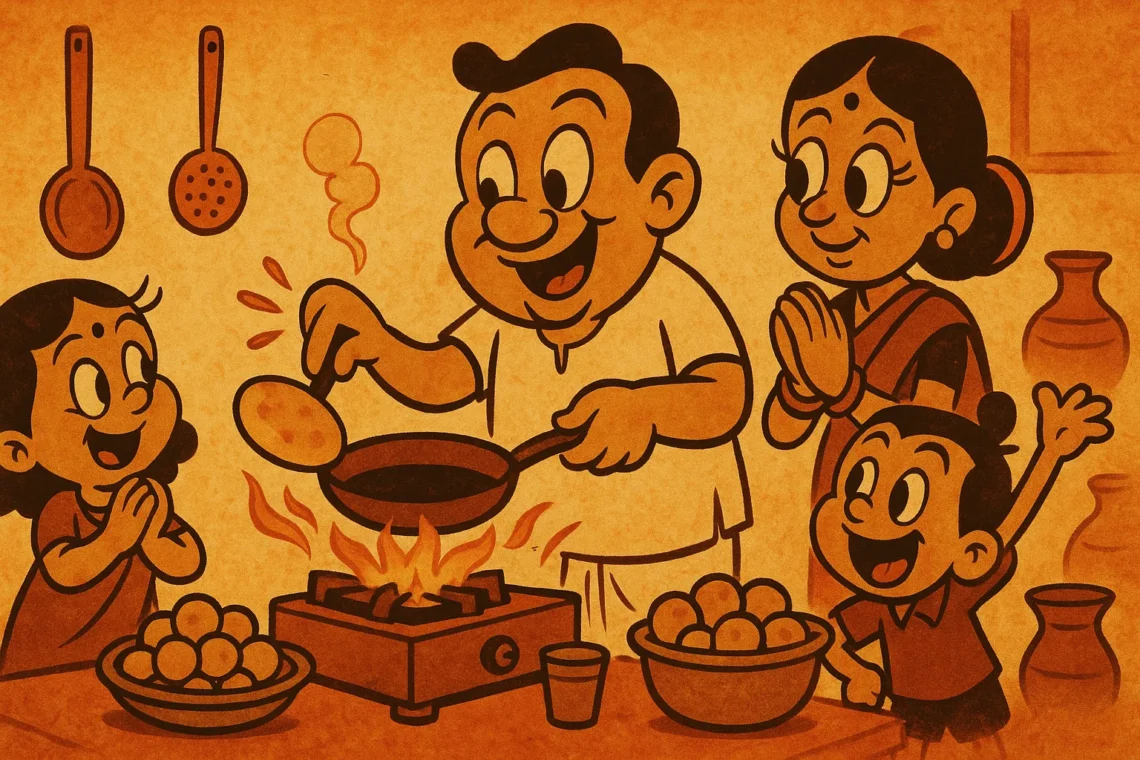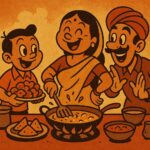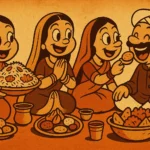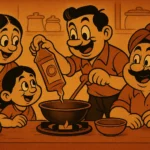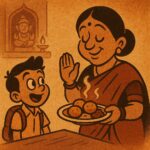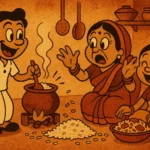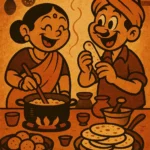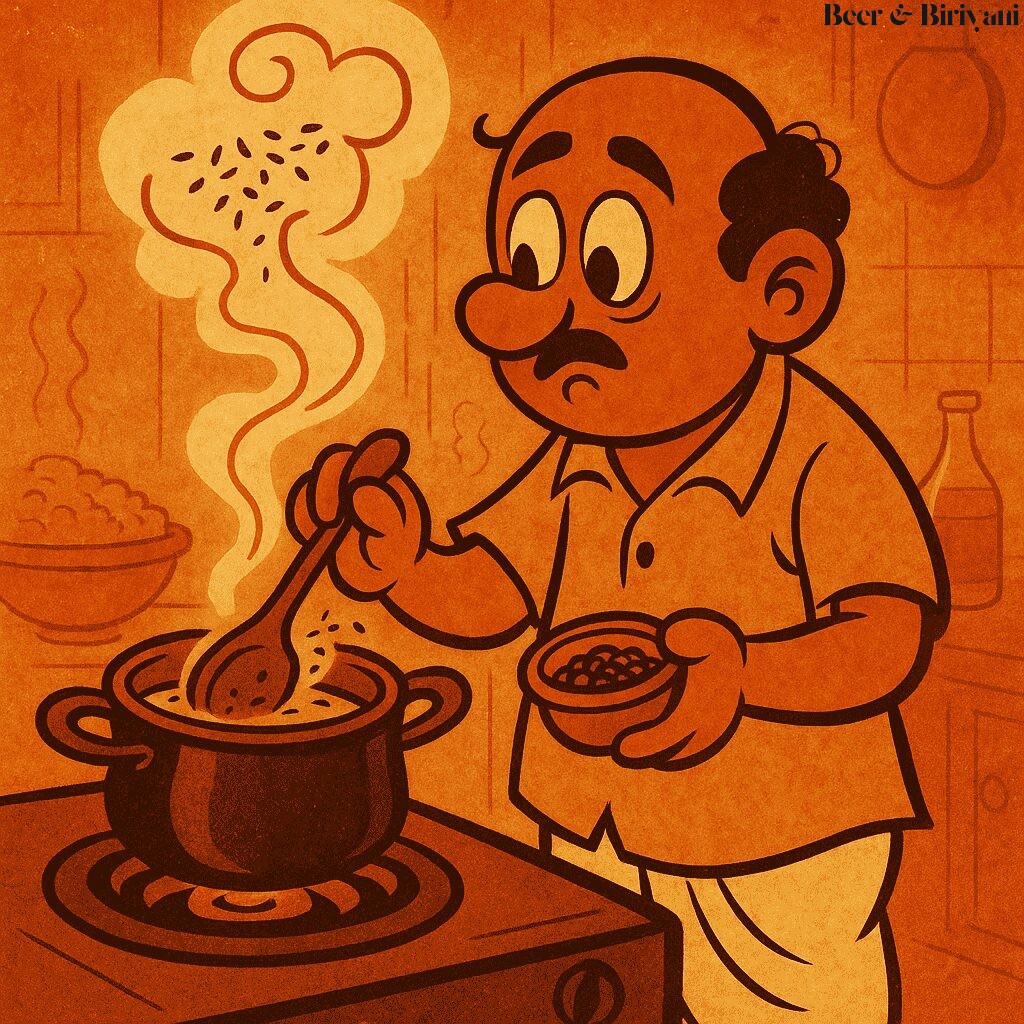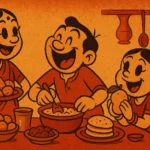My dad didn’t cook often. But when he did, the kitchen transformed. Not in the clatter-and-chaos way that marked my mother’s domain, with her chorus of whistles from pressure cookers and the background hum of Vividh Bharati. No, when my dad cooked, the house slowed down. It was usually a Sunday, the newspaper still scattered on the dining table, and there would be an almost meditative stillness before the oil even hit the pan.
There was no performance to it. No apron, no spatula flair. He wore his usual white vest and lungi, tucked up to the knee, as if cooking was a small detour between fixing the tube light and taking a nap. But his methods were precise. If he said two spoons of jeera, you knew he meant level, not heaped. He sliced onions into thin half-moons like he was solving a geometry problem. His sambar was a slow, simmering negotiation between sourness and earthiness. And his potato fry — dry, crisp, just enough mustard seeds to surprise your teeth — was the stuff of family legend.
Not Just Food — A Mood
As a kid, I didn’t notice the difference immediately. I just knew lunch was going to be unusually quiet, focused. No shouting for more papad, no “where’s the salt.” We ate what he served. We watched him more than the food. And there was always a pause — a short, collective silence after the first bite, where we all agreed, without saying it, that this was special.
Food made by my dad wasn’t loud in flavor or complex in technique. It didn’t have the drama of my mom’s festive puran polis or the midnight biryanis cooked by my chacha in Nagpada. But it held a kind of quiet confidence. It was the food of someone who didn’t have to impress. Someone who just wanted you to feel full — and, somehow, okay.
The Last Time He Cooked
The last time my dad cooked for me was after I moved to Austin. I had come back to Mumbai for a visit after three years. He didn’t say much — just asked if I’d like some drumstick sambar and potato fry. He hadn’t been keeping well, but there he was, chopping onions again, exact as ever.
I sat on the kitchen stool, the one with the wobble, watching him. The gas flame flickered under the kadhai, and I realized this might be the last time I’d eat something cooked by his hands. That realization felt like a chill in my spine — not melodramatic, just… real.
The meal was as perfect as always. The sambar had that slow, deep flavor that only happens when someone truly pays attention. The rice was steaming, fluffy, just the right stickiness. And the fry? Golden-edged, turmeric-dusted comfort. We didn’t talk much. We just ate.
The Leftovers of Memory
After he passed away, I found myself recreating that meal. Not out of tribute, not to post an Instagram reel captioned “Dad’s recipe,” but because I missed the feeling it brought. I needed that calm, that quiet center. But it’s tricky — memory doesn’t translate well into teaspoons and minutes.
The first time I tried, the sambar was too tangy. The second, not enough toor dal. The potato fry always lacked that elusive crunch. I realized I wasn’t trying to copy the food — I was chasing the mood, the way it made the house feel, the way it made me feel.
And maybe that’s what nostalgia recipes are. Not perfect recreations, but edible conversations with the past. You cook because it lets you visit someone you miss. You chop onions like they did, you hum the tune they used to hum, you smell something familiar and suddenly you’re five years old again, watching your dad stir a pot.
What We Remember Through Taste
Food is often memory’s most stubborn medium. You forget dates, misremember names, lose photos to dead hard drives. But the taste of something — your mother’s coriander chutney, your uncle’s Eid sheer khurma, your college friend’s Maggi on rainy nights — that stays.
Even now, living thousands of miles away in Texas, I find myself reaching for mustard seeds and curry leaves when I’m homesick. Not to recreate a dish exactly, but to bring back a sliver of a Sunday afternoon, a warm kitchen, and the sound of my father tapping a spoon on the edge of the pressure cooker lid.
When my dad cooked, it wasn’t just about the food. It was about slowing down. About care without fuss. About presence. And in a world where everything moves too fast — even grief — that’s the flavor I miss the most.
So I keep trying. One Sunday at a time.
Born in Mumbai, now stir-frying feelings in Texas. Writes about food, memory, and the messy magic in between — mostly to stay hungry, sometimes just to stay sane.

